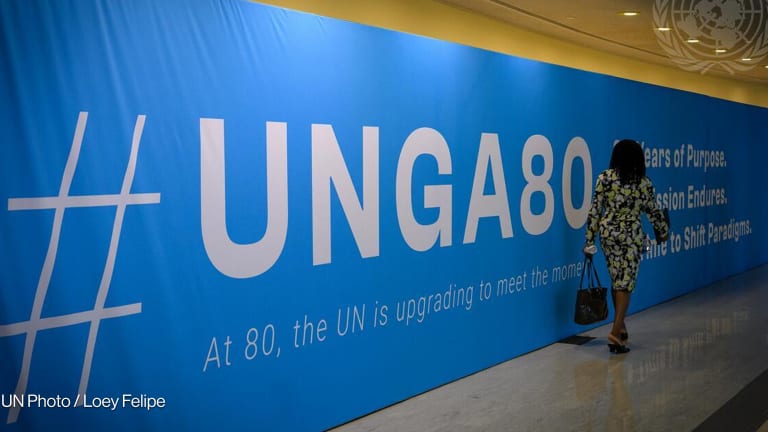
Marta Ruedas has an explanation why Lebanon fell three spots on the United Nations Development Program’s Human Development Index in 2009. According to the UNDP resident representative in Beirut, it was more of a case of other nations faring better in promoting human development.
Living conditions in Lebanon are not necessarily deteriorating, said Ruedas, adding that the country would be better developed had it not been for various crises it faced over the last four to five years. These include the 2005 assassination of Prime Minister Rafic Hariri and the 2006 conflict with Israel.
Aside from her duties with UNDP, Ruedas serves as U.N. resident coordinator in Lebanon, and holds the post of deputy special coordinator, or deputy head, of the integrated U.N. mission focusing on development. The Spanish native also tackles population concerns.
In October, Devex met with Ruedas in Beirut. In this first part of our interview, she shared her thoughts about development in the Middle Eastern nation.
What is the most challenging issue you have to overcome in Lebanon in terms of development?
One of the main reasons why Lebanon doesn’t move forward as fast as it has the potential to do is its governance system, meaning not only the government itself, but the fact that the government is set up in a confessional system, and this pervades pretty much all facets of activity in Lebanon. If you can get away from that, I think a lot of other things would follow.
Is there anything being done to try to rectify the situation?
This is something that so permeates everything that it’s a long road. UNDP published at the beginning of this year, the National Human Development Report, which was called “Towards a Citizen State.” It did address a lot of these issues, trying to get them out in the open and get some discussion going on that. The political side of the house is also trying to address this through political means. We’ve got a peace-building program, which tries to bring people together from the different confessions, religions and communities. There are many numbers of different ways that we try to address this at the grassroots level, at the higher political spheres, and everywhere in between. But it’s not a short-term agenda.
Have you had to shift the focus of any projects due to the conflicts and wars Lebanon has endured over the past four to five years?
Yes, definitely. There were two really big turning points. One was the assassination of Prime Minister Rafic Hariri in 2005. That threw the government into a fair amount of turmoil. And so, a number of things were stopped until the government started again, and we had to put things on hold. Then in 2006, the war broke out, and a lot of what we did then had to be turned into recovery work, rehabilitation work, and so on. There was a huge focus on the south and essentially all the areas that came under heavy fire by Israel, and this required a lot of concentrated attention from the entire U.N. system. Over time, those areas, especially the south, have recovered quite considerably. So now, we’re moving out of that and we’re focusing our attention on more developmental issues, more poverty-related issues, rather than war recovery and reconstruction.
What are the future development trends in Lebanon going to be?
It’s always hard to tell in Lebanon! There’s been a shift in focus, more towards the north. We’re dealing a lot more with areas such as elections, such as the Palestinian issue, a number of things that were de-prioritized given other issues that were of more importance at the time, will be focused on. On the other hand, if Lebanon continues doing well politically, it will also do a lot better economically, and then, probably, we’ll probably scale down activities. In the past four to five years, we’ve scaled up considerably. So, we’ll probably be scaling down, unless we have more crises, which you can never tell.
In terms of security being a prerequisite for development, what are the plans for increased security within Lebanon?
That is actually primarily the focus of the political mission. Principally, there is one Security Council resolution, 1701, which formalized the agreement to end the war with Israel. That includes a number of provisions for disarmament of certain factions for the institution of a permanent cease-fire, those kinds of things which all goes towards security for Lebanon. But that’s more on the political front.
Read part two of our interview with Marta Ruedas, where she indicates UNDP’s projects in Lebanon and reveals what the agency looks for in job candidates.








